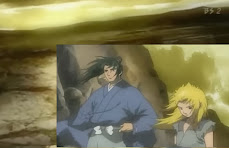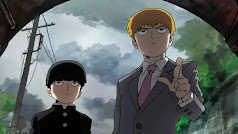Kate: Chapters 34 & 35 of Hills of Silver Ruins are very exciting! Chapter 34 specifically does a great job paying off Taiki's outsider status, namely Taiki does not behave as a Kirin is expected to behave. As Rousan states, "I don’t imagine there has ever been another kirin in the whole history of this world who inflicted such wounds with his own hand.”
Of course, from the beginning, even as a child, Taiki has demonstrated remarkable pragmatism—when he chose Gyousou, yet worried that his motives were entirely personal; when he forced himself to bow to Asen; and in Chapter 34, when he recognizes that his only hope is to fight his way to his emperor.
The Kirin is usually presented as pacifistic, abhorring
violence and blood (quite literally). You address here why the Kirin is pacifistic (perhaps) in behavior but not necessarily in nature. (Or pacifistic in nature but not necessarily in behavior.)
Has Japan ever had peace movements dedicated to pacifism as in America? Flowers in rifles, that sort of thing? Was its isolationism connected to peace movements, as isolationism was in America and Britain (in some pockets)? Or is the Japanese attitude far more pragmatic: peace, to a point? (Leave us alone is not, after all, the same as We don't want to fight or pay for a fight.)
Eugene: Japan's isolationism during the Edo period was enforced with a mailed fist. Tokugawa Ieyasu had observed how Oda Nobunaga armed himself with European weaponry to destroy the feared Takeda clan (Ieyasu took part in that battle). He subsequently wisely stayed out of Hideyoshi's ruinous invasion of Korea. And then in 1637, Ieyasu's grandson had to deal with the bloody (Christian) Shimabara Rebellion.So while the Edo period is commonly described as "peaceful," that was the product of mostly effective rule and ruthless enforcement that did not shirk from punishing anybody who disturbed the peace (as all those samurai dramas make clear).
Today, the closest thing to flowers-in-rifles is the quasi-religious peace movement that grew out of the various post-war nuclear disarmament causes. In Japan, it punches way above its weight in PR terms because many politicians sign on for the photo ops and the favorable press coverage. They have little to lose. Japan will remain firmly ensconced beneath the "nuclear umbrella" provided by the United States. Thanks to Article 9 of the Japanese Constitution (outlawing war as a means to settle international disputes), when it plays its cards right, Japan can have its peace cake and eat it too.But Japan is not New Zealand and is located in a very dangerous neighborhood. Unlike Germany's Green party, the left in Japan, like the Tokugawa shoguns, have no illusions about what it takes to preserve the peace. So alongside the United States, Japan's SDF (self-defense forces) maintain the most powerful blue-water navy in the region. No serious Japanese politician contests that necessity.
Kate: In Book IV, Chapter 38 of Hills of Silver Ruins, Taiki needs to return to Mount Hou to recover from taking blood. In several books, Taiki implies that he has to pay for what happened in Japan, even though it was legally not his fault (he had no knowledge of the crimes though his literal physical presence was responsible for them).
Karma--what goes around comes around (at its simplest)--is a basic human concept. How embedded would you say the idea is in Ono's work? Does the philosophy extend beyond how Westerners conceive it? Or use it?
 For instance, many of the Asian shows I watch give a little more credence to the idea of words/concepts (what has gotten thrown out into the universe) being fulfilled. Where Westerners might have characters overcome such a (superstitious) worry or congratulate themselves for their entirely invisible forward thinking, the Asian shows imply that behavior on-screen might actually, ya know, come true. (There's a kind of unreality about Western name-calling, which is why bullying theorists can entirely divorce themselves from the outcomes of their behavior.)
For instance, many of the Asian shows I watch give a little more credence to the idea of words/concepts (what has gotten thrown out into the universe) being fulfilled. Where Westerners might have characters overcome such a (superstitious) worry or congratulate themselves for their entirely invisible forward thinking, the Asian shows imply that behavior on-screen might actually, ya know, come true. (There's a kind of unreality about Western name-calling, which is why bullying theorists can entirely divorce themselves from the outcomes of their behavior.) The opening "this is fiction" caveats are subtly different: Western art says, "No, no, I didn't base this story on anyone real. Don't go and sue me." Asian art says, "This is fiction. The actions in this series are for entertainment. They are not intended to urge or promote any particular behavior. Really."
Watch out! Don't go wishing for monsters because, as in Supernatural, they will likely show up!
Of course, that was more about the politics of the situation, but a similar sort of restraint is still expected.
Karma is a key element of Buddhist philosophy. Karma arises out of a very cool Buddhist concept, the "storehouse consciousness." It is a cosmic database that stores a record of all your past personal actions. Not like a video recording, but rather the metadata, a set of attributes created from those events. This is what passes onto your next life, not a soul in the Christian or Hindu sense.
As in Angel Beats, your soul is preserved if you get stuck in purgatory. Lord Enma, ruler of the underworld, can use his "Mirror of Judgment" to display a sinner's misdoings. But this record is wiped upon reincarnation. Only the store consciousness remains.
What matters is how you react to events (random or otherwise) going forward. In narrative terms, it's all about the character arc that results. Every action and decision changes the attributes in the storehouse in an ongoing feedback loop, pushing behavioral outcomes in one direction or the other. As Fuyumi Ono puts it, "The small stones accumulated in the past one day produce a mountain of results."
Buddhism takes literally the famous saying by William Faulkner: "The past is never dead. It's not even past."









































